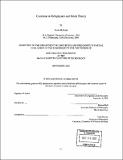Causation in metaphysics and moral theory
Author(s)
McGrath, Sarah, 1972-
DownloadFull printable version (3.562Mb)
Other Contributors
Massachusetts Institute of Technology. Dept. of Linguistics and Philosophy.
Advisor
Edward Hall.
Terms of use
Metadata
Show full item recordAbstract
Chapter 1: The causal relata. Ordinary talk suggests that entities from different ontological categories can cause and be caused: Kathy's throw, the fact that Kathy threw, and Kathy herself can all cause the window to break. But according to the majority view, causation exclusively relates events. This chapter defends the contrary view that the causal relata are as miscellaneous as ordinary talk suggests. A question remains: is there an ontological kind K such that causal relations on entities of that kind are somehow more fundamental than causal relations on the non-Ks? I argue that there is such a kind: facts. I defend this claim against objections. Chapter 2. Causation by omission. Ordinary talk also suggests that omissions can be causes. For example, if Barry promised to water Alice's plant, didn't water it, and the plant then dried up and died, then Barry's not watering the plant-his omitting to water the plant-is a cause of its death. But there are reasons to think that either there is no causation by omission, or there is far more of it than common sense allows. I argue that neither disjunct is acceptable, and propose that we avoid the dilemma by embracing the view that causation has a normative component. The proposal faces the objection that causation is a paradigmatic example of a natural, and so entirelynon-normative, relation. (cont.) I argue that the objection can be defused once we are clear about the kind of normativity that plays a role in causation by omission. Chapter 3. Causation and the Making/Allowing Distinction. Common sense morality suggests that it can matter morally whether an agent makes an outcome occur or merely allows it to occur. For example, it is far worse to pinch your little brother than to allow him to be pinched. I argue against the assumption that the making/allowing distinction is exclusive: in fact, the categories of making and allowing overlap. I go on to offer a positive account of makings, and a positive account of allowings.
Description
Thesis (Ph. D.)--Massachusetts Institute of Technology, Dept. of Linguistics and Philosophy, 2002. Includes bibliographical references.
Date issued
2002Department
Massachusetts Institute of Technology. Department of Linguistics and PhilosophyPublisher
Massachusetts Institute of Technology
Keywords
Linguistics and Philosophy.